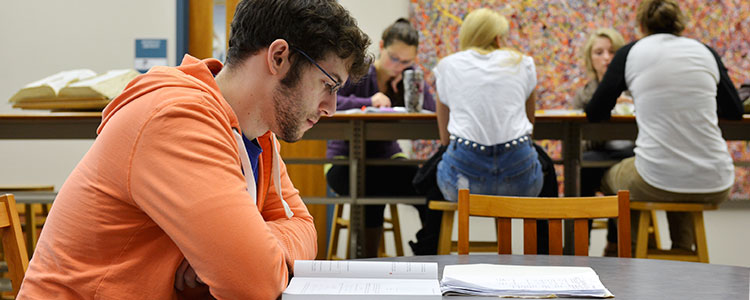Physics, Astronomy & Meteorology

The goal of the Department of Physics, Astronomy and Meteorology is to provide students the opportunity to understand the physical laws governing the universe. The fundamental relationships between energy and matter are studied, from the age of the ancient scientists through the eras of Newton and Einstein and up to the present day. Applications are made to the fields of astronomy, earth and planetary sciences, electronics, engineering, meteorology and to the many branches of physics, from classical mechanics to quantum nuclear physics. In addition to experiencing practical applications of the laws of nature, students develop an understanding of the role of science and technology in contemporary society.
- Program type: Bachelor of Arts, Bachelor of Science
- Minors / Options: Bachelor of Arts in Earth & Planetary Science, Bachelor of Science in Meteorology, Bachelor of Science in Secondary Education-Earth Science, Minor in Astronomy, Minor in Earth & Planetary Science, Minor in Meteorology, Minor in Physics
- School: Macricostas School of Arts & Sciences
- Primary Location: Midtown campus
- Program Sheets:
Consistent with the university’s mission to serve as an accessible, responsive, and creative intellectual resource for the people and institutions of Connecticut, the Department of Physics, Astronomy, and Meteorology endeavors to provide a complete and current education in the principles and applications of physics, astronomy, earth and planetary sciences and meteorology, in ways that accommodate the students’ backgrounds and career objectives.
Objectives
To accomplish this mission, the Department of Physics, Astronomy, and Meteorology:
- Stresses an understanding of the fundamental relationships between matter and energy and the various transformations between them.
- Provides an understanding of the relationship between classical and modern physics and their application to the more applied disciplines of astronomy, earth and planetary sciences, and meteorology.
- Provides students with the experimental and theoretical background necessary to pursue careers as teachers in earth and planetary sciences.
- Provides undergraduates with the theoretical and operational background necessary to pursue careers in broadcast meteorology and weather forecasting.
- Maintains an active and publicly responsive program of outreach and extension through the WCSU Observatory and the Meteorological Studies and Weather Center.
- Provides students with the opportunity to gain real-world, hands-on experience while developing professional skills in forecasting, nowcasting, and consulting meteorology through academic internships offered through the Meteorological Studies and Weather Center.
- Develops the professional skills required by broadcast meteorologists by supervising students who produce and present weathercasts as part of on-campus radio and TV programming.
- Provides students with a breadth of working knowledge about aspects of the earth and planetary sciences (such as climate change and remote sensing) as well as the opportunity to develop marketable skills (such as familiarity with instrumentation, data analysis methods and software) through coursework, research projects with faculty and departmental internships.
- Provides students with pre-engineering training and the necessary skills to enter various technical fields.
- Provides laboratory and research experiences using modern instrumentation and data reduction techniques.
- Fosters critical thinking, creativity, computational and analytical skills through laboratory exercises, course assignments and personalized research experiences.
- Provides a personalized learning environment for our students through faculty-supervised research opportunities, student-faculty research collaborations, student internships, and individualized instruction.
- Supports science education efforts in regional schools and for the public, through open houses, lecture series, activities sponsored by student clubs and other special events, and by collaborations between department faculty and other science educators.
- Fosters the growth and development of its faculty through research, attendance at professional meetings, publication and presentation of scholarly work, and support of research initiatives.
- Expresses a strong commitment to public service by collaborating with regional elementary, junior and senior high school educators to promote science education.
B.A.: Earth and Planetary Sciences:
- Students will be able to understand scientific concepts including the use of scientific method, and develop problem-solving skills.
- Students will demonstrate competence in the use of computers for graphical analysis of data, manipulation of databases, numerical modeling and internet researches.
- Graduating seniors will demonstrate competence in research project development, execution, completion and reporting.
B.S.: Meteorology:
- Students will have a basic knowledge of fundamental physics, especially those topics in thermodynamics and hydrodynamics which are relevant to the understanding of the structure and evolution of important atmospheric processes.
- Students will have a basic background in quantitative, mathematical and computational analysis, especially as it applies to understanding the atmospheric and earth sciences.
- Students will be able to use meteorological skills to analyze real-time weather data available via the internet and other data sources to make an operational weather forecast.
- Students will have a basic knowledge of earth and planetary sciences, especially oceanography, astronomy and/or geology.
- Students will gain knowledge from workplace experiences via internships or research experience under the supervision of department faculty.
- Students who avail themselves of certain elective courses will have knowledge of/experience with communication of scientific information through video weathercast production, graphics and performance.
Minor Program Sheets:
To learn more about the Physics, Astronomy, and Meteorology department, please follow the links below

